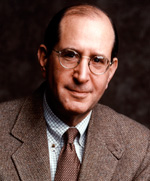“Alfred Sommer’s work has improved the lives of millions of people worldwide, and his commitment to public health is an exceptional display of research, science and compassion. We are delighted to present him with the Francis Medal.”
—President Emerita Mary Sue Coleman, University of Michigan
2010 Recipient

The University of Michigan awarded the Thomas Francis Jr. Medal in Global Public Health to Alfred Sommer, whose research into vitamin A deficiency has saved millions of children from blindness and death.
Sommer is a professor of epidemiology, international health, and ophthalmology at the Bloomberg School of Public Health and the Johns Hopkins University School of Medicine. Vitamin A supplementation is known to be one of the most cost-effective of all health interventions.
“Alfred Sommer’s work has improved the lives of millions of people worldwide, and his commitment to public health is an exceptional display of research, science and compassion. We are delighted to present him with the Francis Medal,” said U-M President Mary Sue Coleman.
Sommer is emeritus dean for the Bloomberg School of Public Health, and has published five books and more than 250 scientific articles. He’s received dozens of top honors, including the Lasker Award for Medical Research, and was the first recipient of the GVF prize of the German Association of Applied Vitamin Research.
His initial vitamin A work occurred from 1976-1980, when Sommer conducted a series of studies in Indonesia that suggested vitamin A deficiency was more common than previously recognized, and that even mild vitamin A deficiency dramatically increased childhood mortality rates.
Parallel studies Sommer organized with colleagues in Africa showed that most cases of measles-associated pediatric blindness, and half of all deaths, were also related to low vitamin A levels and could be prevented by timely administration of vitamin A to all cases of severe measles.
Next, Sommer and his colleagues ran large-scale randomized trials from 1983 through 1992 and demonstrated the link between even mild vitamin A deficiency and pediatric mortality.
Sommer and colleagues next showed oral high-dose vitamin A supplementation could quickly and cheaply treat the devastating effects of vitamin A deficiency. Subsequently, the World Development Report (World Bank) declared vitamin A supplementation one of the most cost-effective of all health interventions.
The latest research by Sommer and his colleagues has shown that supplementing Nepalese women of childbearing age with vitamin A or beta-carotene can reduce maternal mortality by an average of 45 percent, and newborn vitamin A supplementation can reduce neonatal mortality by 20 percent.
Coincidentally, the Thomas Francis Jr. Medal ceremony occurred the same fall as the 50th anniversary of John F. Kennedy’s announcement of the idea for the Peace Corps on the steps of the Michigan Union. U-M celebrated this anniversary with a series of campus events. Sommer has a strong connection and loyalty to the Peace Corps. While still in medical school he and his wife signed up for and were accepted for Peace Corps service, but a position at the Centers for Disease Control and Prevention in Atlanta became available, and Sommer accepted an assignment to the Cholera Research Laboratory (now ICDDRB) in Dhaka, Bangladesh, where he conducted groundbreaking epidemiologic investigations into cholera, smallpox and provision of disaster assistance.
Sommer credits the Peace Corps for fueling his initial desire to work overseas in a public health capacity. Today, Peace Corps volunteers are involved in the administration of vitamin A to children in countries around the world, and Sommer said he often gets emails from Peace Corps volunteers worldwide with questions about vitamin A supplementation.
Medal Presentation Event
Presentation of the Thomas Francis, Jr. Medal in Global Public Health to Alfred Sommer, M.D., M.H.S.
Thursday, November 4, 2010, 2-4 p.m., Blau Auditorium, Ross School of Business
A reception followed the event Download event program (PDF) »
Sommer addressed “Vitamin A Deficiency, Health and Mortality”
Followed by a panel discussion featuring:
Anil B. Deolalikar, professor of economics and associate dean, social sciences; Co-Director of the One Health Center, University of California Global Health Institute
Kathy Spahn, president and CEO, Helen Keller International
Eduardo Villamor, associate professor of environmental health sciences and epidemiology, University of Michigan School of Public Health
You can also view “The A Factor: Highlights” video introduction of Dr. Alfred Sommer, his work, and discovery at the YouTube link below. The A Factor: Highlights was produced and provided by Steven C. F. Anderson, Anderson Productions, Ltd.
